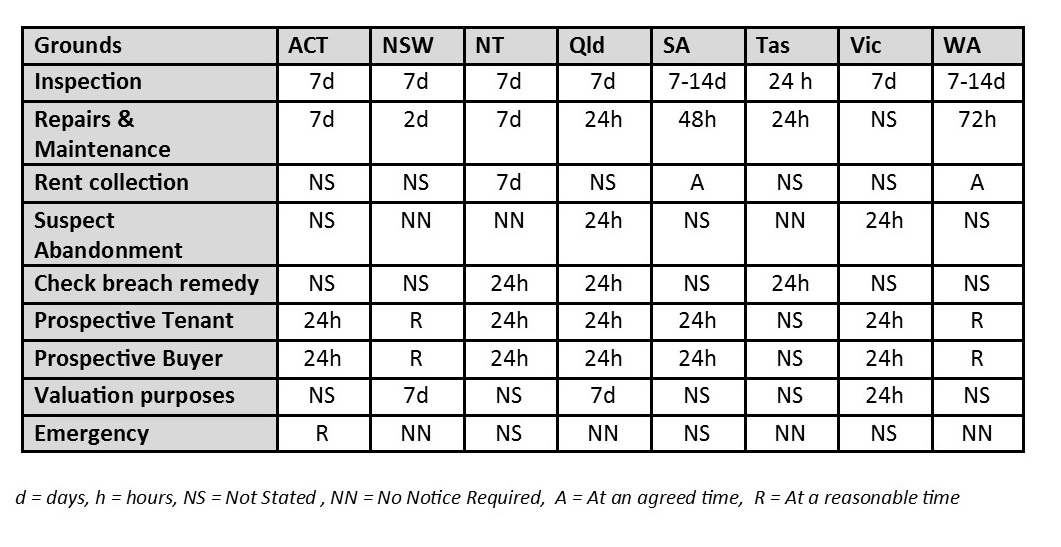
04 Feb Landlord right of entry
A tenant is vacating the property and the landlord wants to conduct some inspections before the lease ends – another tenant has also reported maintenance issues with the roof of the home.
These scenarios, recently faced by two eezirent landlords, provide legal grounds for the owner to access the property. However in both cases the tenants were refusing to allow entry to the property by the landlord creating very difficult situations. Believe it or not, a tenant was objecting to access to fix a problem they had reported.
What is the protocol for accessing your rental property?
The right to access is determined by three tests:
a) the grounds or purpose of the visit
b) giving the required notice period in writing and
c) the concept of ‘reasonableness’.
The table below summarises the lawful grounds for entering your property and the notice periods required by each state’s legislation. Essentially, if your reason for visiting the property complies with the grounds and notice periods listed – then you passed two of the three tests for entry. Note that all notice periods can be waived if the tenant and landlord agree.

This brings us to the subject of ‘reasonableness’. This requirement is in keeping with the principle of quiet enjoyment, and makes perfect sense. It is not unreasonable for a tenant to object to early morning or late night inspections. Nor can they be blamed for refusing access on a Sunday or Public Holiday. Issues can arise with frequency of some visits – particularly if the property is being advertised for rent or sale. Such inspections ought to be co-ordinated to have one inspection after another on pre-arranged times or run an open home.
Getting back to our opening scenarios – these landlords had complied with all the necessary requirements and the tenants still refused entry. First of all, despite what tenants might believe or say, they cannot ‘refuse’ entry if all the legislative requirements are met. This means little though if the tenant is physically blocking access.
If the tenant is displaying aggressive behaviour when you lawfully attempt to enter – remove yourself from the situation. Then contact the police to report the behaviour. This does not necessarily mean the police will escort you to the property. In fact that is unlikely to occur. But you should make the police aware of the aggressive behaviour of the tenant. This may come in handy if you take the matter to tribunal.
Each state has provisions for landlords to apply to the relevant tenancy/small claims tribunal to seek orders permitting entry. As well as seeking orders to grant access, if the tenant has behaved aggressively, you might also wish to seek an order to terminate the tenancy on the basis of the tenant’s objectionable behaviour – hence the value in reporting the aggressive behaviour to the police.
Of course you may not wish to take the matter to tribunal. It might be best to simply wait if the tenant is due to vacate in the not too distant future. This was the path one of our landlords took who was trying to minimise the vacancy time by showing the soon to be vacant property to a prospective tenant. If however, the tenant is being difficult about entry and the lease has considerable time to run, then the tribunal path way might be necessary.
At the very least, you should not renew the lease and make sure you issue the termination notice on time to comply with that notice period. Do not extend the privilege of renting your property to a tenant who blocks lawful access.



Sorry, the comment form is closed at this time.